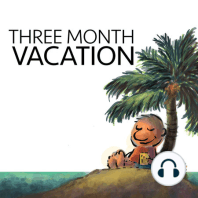7 min listen

Mental Barriers That Slow You Down (And Derail Your Progress) - Part Two
Mental Barriers That Slow You Down (And Derail Your Progress) - Part Two
ratings:
Length:
28 minutes
Released:
Oct 2, 2017
Format:
Podcast episode
Description
How many books do you read in a year? Most people boast about how they read hundreds of books a year. That's what I used to do as well. Until I found that I wasn't really absorbing any information. So is speed reading a bad idea? Well, not entirely, but you need to know when to use it and why. Find out how speed works for you and more importantly, when it fails. Read it online: Mental Barriers Myths --------- Mental Myth: You need to speed up your learning (and there are systems to go faster) If you looked at the About Us page on the Psychotactics site, it used to say that I read 100 books a year. Well, that was true when I started out in business. I didn't have many clients, hence loads of time. It was also the very early days of the Internet. There were still millions of pages online, but blogs barely existed. Youtube was non-existent. Facebook was years away. If you wanted to get those 100 books, you had to physically make your way to the book store or the library. Nothing online was particularly instant or as distracting as it is today. Even so, I bought a book on speed reading. In fact, it was an entire course. The course was instantly impressive. It showed me how my brain could recall just about anything it viewed even for a brief second. It got me to open a random page of the dictionary, then flick through the page and later recall a fair bit of what was on the page. It was a long time ago, and I forget the details of the exercise, but I was hooked into believing I could store endless amounts of information in my head. As I found out, it wasn't impossible to store information, but it was quite like a photocopy machine. Think of a photocopy machine for a few seconds What is the primary function? It takes photocopies of information. You can run tens of thousands of pages through a photocopy machine, and it just takes images. Your brain, from what I understand, can do something similar. However, it does not mean that your brain can make sense of the information. It's just information, loads of information piling up on top of more information. The speed reading course was instantly enjoyable and useless to me, even back in those early days. I abandoned it despite paying a small fortune for it and went back to reading two books a week at top speed. For someone like me, who was just learning marketing and business reading a lot was a great idea It was a bit like getting to know the streets in a city. It gave me the confidence and feel for the city. And I didn't have a fear of getting lost. And this constant, pounding flow of information is great as long as you don't have to do too much with the information. You watch the news; you read magazines, you listen to podcast interviews. They constitute a mountain range of information, but not information you necessarily need to use, now or in the future. I found that I was losing out on depth In my need to keep up with 100 books a year, or even 25 books a year, I was playing a game of chicken. I was headed right towards my goal, refusing to swerve, and in doing so, missing out on the nuances. To bounce back to the analogy of the city streets, I was getting a lot of information, but not enough depth. I didn't need to speed up my learning. I could take things at a reasonable pace and even slow down. When I slowed down, I noticed something quite interesting I missed out at least 30-50% of the nuances in the first reading or listening. I remember listening to how trees absorb nutrition, for example, and I loved that podcast episode, so I heard it again. And again. And yet again. The fourth time around I was still picking up nuances I'd missed on the earlier drive-throughs. It wasn't enough to read and listen at normal speed but to go back and read again, listen again. Which is why the book, The Brain Audit has a note right in the introduction to go back and read the book thrice. And most clients come back to say that they were surprised at how much they learned on the second and third p
Released:
Oct 2, 2017
Format:
Podcast episode
Titles in the series (100)
Is The Four-Hour Work Week A Waste Of Time?: Why A Four-Hour Workweek Isn't What We Really Want by The Three Month Vacation Podcast